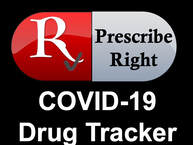|
COVID-19 Vaccines
In a preprint draft of a 108,851 patient, British trial, efficacy in preventing COVID-19 was 60-70% after one dose of the Pfizer-BioNTech vaccine and 85-90% after two doses. The AstraZeneca COVID-19 vaccine was 60-73% efficacious after one dose. Data was not available to determine efficacy after two doses of the AZ vaccine. Both vaccines were effective in reducing hospitalizations. Physicians at Massachusetts General Hospital describe delayed cutaneous reactions in 12 patients, who were given the Moderna COVID-19 vaccine. The reactions happened around eight days after the initial immunization and lasted about six days. All patients received their second dose of vaccine and six of the patients developed a second reaction within two days. While the cutaneous reaction is rare, it is more likely to be seen during a mass vaccination campaign, due to the large number of vaccinations. A preprint draft describes a 4,387 patient, Phase IIb trial (NCT04533399), where two doses of the Novavax COVID-19 vaccine given 21-days apart resulted in 49.4% efficacy based on 44 cases of moderate to severe COVID-19 that developed in a subpopulation of 2,684 patients that were seronegative in a South African study population. This population had both HIV positive and negative patients. Efficacy was 60.1% among only HIV negative patients. Genome sequencing of 41 patients found the South African variant (B.1.351) was present in 92.7% of cases. A post-hoc analysis found that vaccine efficacy against B.1.351 was 51.0%. Prior infection with the presumptive original SARS CoV-2 did provide protection in the placebo group or additional benefit in the vaccine group. The CDC has provided clinical considerations for the Pfizer-BioNTech, Moderna and Johnson & Johnson COVID-19 vaccines.
COVID-19 Antivirals Merck announced results from a secondary endpoint in a preliminary report from 182 patients enrolled in a Phase IIa trial (NCT04405570), where 24% of patients treated with molnupiravir achieved a negative cell culture on day five compared to none that received placebo in adult outpatients with symptomatic COVID-19. Merck plans a full presentation of trial results at a future meeting. CytoDyn announced that in a 28-day, 390 patient, Phase IIb/III trial (NCT04347239), treatment with leronlimab did not decrease mortality compared to placebo in patients with severe or critical COVID-19. However, leronlimab did decrease mortality and hospital duration in a subset of patients receiving mechanical ventilation. An age adjusted analysis also found a mortality decease in the subset of patients under 65. In the 21-day, 400 patient, Phase III, EPIC trial (NCT04405843), a five-day course of ivermectin did not reduce the time to resolution of symptoms compared to placebo in patients with mild COVID-19. COVID-19 Antibodies NIH discontinued the 15-day, 900 patient, Phase III, C3PO trial (NCT04355767) after 511 patients were enrolled, when an interim analysis by the independent data and safety monitoring board did not find that treatment with convalescent plasma reduced emergency treatment, hospitalization or death in patients with mild-to-moderate COVID-19. VIR-7831 is being evaluated as part of the NIH sponsored, 90-day, 10,000 patient, Phase III, ACTIV-3 trial (NCT04501978) to determine whether adding the monoclonal antibody to remdesivir improved clinical status. NIH closed enrollment of patients in the VIR-7831 arm of the trial due to concerns by the data and safety monitoring board on the magnitude of potential benefit after an interim analysis of data from 344 patients. The combination of BRII-196 and BRII-198 are being evaluated as part of the NIH sponsored, 90-day, 10,000 patient, Phase III, ACTIV-3 trial (NCT04501978) to determine whether adding the monoclonal antibody to remdesivir improved clinical status. NIH discontinued enrollment of patients in the BRII-196/BRII-198 arm of the trial when a futility analysis by the data and safety monitoring board did not find a benefit with the combination in an analysis of data from 343 patients. The NIAID is evaluating the combination of BRII-196 and BRII-198 in the treatment of mild-to-moderate COVID-19 in patients who do not required hospitalization in the ACTIV-2 trial (NCT04518410). COVID-19 Anti-Inflammatories The 15,000 patient RECOVERY trial (NCT04381936) has several arms testing lopinavir-ritonavir, dexamethasone, hydroxychloroquine, azithromycin, tocilizumab, convalescent plasma, immunoglobulin (IVIG), the monoclonal antibody combination REGN-COV2, aspirin, baricitinib, and colchicine. British researchers discontinued enrollment in the colchicine arm of the trial, when the independent Data Monitoring Committee did not find a reduction in 28-day mortality (20% colchicine vs 19% usual care alone). NIH recommended adding tocilizumab to dexamethasone in hospitalized patients who are exhibiting rapid respiratory decompensation due to COVID-19, which includes patients within 24 hours of admission to the ICU that require invasive mechanical ventilation, noninvasive mechanical ventilation or high-flow nasal cannula oxygen, and non-ICU patients recently admitted to the hospital with a rapidly increasing need for oxygen that have significantly increased markers of inflammation. Some NIH Panel members would also recommend tocilizumab if patients exhibit rapidly increasing oxygen needs while receiving dexamethasone and have a C-reactive protein level of 75 mg/L or greater but who do not yet require noninvasive mechanical ventilation or high-flow nasal cannula oxygen. Comments are closed.
|
Stay informed, subscribe to the Prescribe Right Pharmaceutical Pipeline Tracker
Archives
January 2023
Categories |
Services |
Company |
Support |
© COPYRIGHT 2015. ALL RIGHTS RESERVED.
|


 RSS Feed
RSS Feed